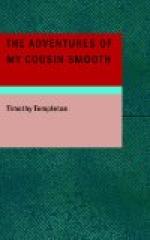inviolable, and that such was held as law, and regarded
in good faith by the federal government of the United
States, how came it that certain States in the federal
compact so far disregarded the rule as to scoff at
the idea of the flag being superior to the municipal
regulations of the port; invade the decks of British
vessels, regardless of the flag; and drag from beneath
its folds British citizens, whom they incarcerated
and made criminals merely to suit the caprices of
a municipal statute? Strange indeed was it for
a nation great as was the American to lay down a principle
of foreign policy the action of which could only be
allowed when it suited the immediate interests of
that nation, and was rejected when it came in collision
with them. He would tell the learned representative
of that nation, that the spirit manifested in such
a course to him ’seemed more to comport with
that specious style of conducting business better
understood among hucksters!’ Here the man of
the American side of the house evinced some excitement,
and quickly rising to his feet, said he would not
stand silently by and hear such imputations cast upon
his house, country, and people. The judiciary
of the United States could not be impugned—none
was purer; while the foreign policy of the United
States stood out a model for the nations of Europe
to pattern from. A counter interruption again
took place. The Umpire drew a long breath; the
good-looking English Commissioner heaved a sigh, and
again commenced amusing himself with the quill; the
sedate American Commissioner yawned, and turned contemplatively
the leaves of a commentary; to end, they all seemed
seized with the yawning fever, which was kept up until
they laughed right earnestly at one another, the handsome
gentleman stretching his arms athwart, and making
a hideous grimace. At length this state of things
was put an end to by the Umpire, who did hope gentlemen
would see, in his dinner hour having arrived, the
necessity of either resting the arguments here, or
postponing them for another day.
“In rejoining, her Majesty’s sharp featured
Councillor having pronounced a high eulogium on his
Honor’s power of endurance, and the onerous
duties imposed upon him by the Governments which he
so nobly sought to serve, and from whom the mere honor
afforded but a meagre compensation, (inasmuch as he
felt convinced the proverbial ingratitude of Governments
would be carried out in their not even compensating
him for the large outlay he had been constrained to
make in law books) hoped he might be permitted to
make a few more remarks. His honor bowing assent,
the well-looking legal gentleman, in blandest accents,
proceeded to say Jonathan must not lay a foundation
for others he was first to knock down; for if a rule
applied to great principles it must not be made subservient
to small exigencies of an opposite character:
Jonathan must bow to his own stumbling-blocks.
It did, however, seem that this Commission had been




